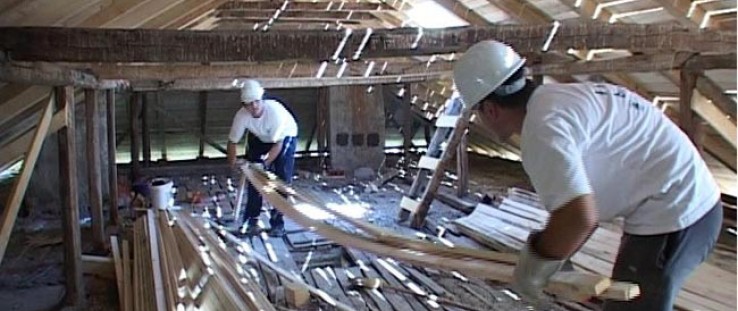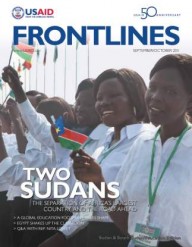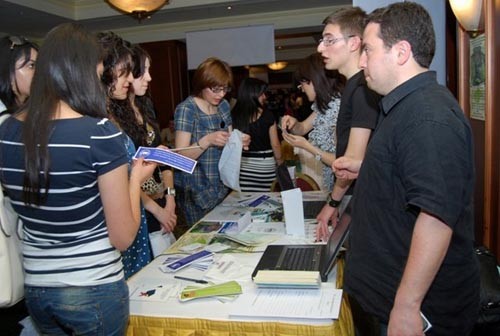 Recent high school graduates in Macedonia get onsite training in Green Jobs Corps internships.
Habitat for Humanity Macedonia
Recent high school graduates in Macedonia get onsite training in Green Jobs Corps internships.
Habitat for Humanity Macedonia
 Recent high school graduates in Macedonia get onsite training in Green Jobs Corps internships.
Habitat for Humanity Macedonia
Recent high school graduates in Macedonia get onsite training in Green Jobs Corps internships.
Habitat for Humanity Macedonia
Two decades ago, the main development challenges across Europe and Eurasia after the disintegration of the communist system were transitioning the collapsed, centrally planned economies to the free market, and supporting the development of a democratic society. Today, perhaps one of the largest development issues in the region is persistently high unemployment and a skills deficit—especially among youth—that is weighing down economic growth.
In Macedonia, a third of the overall population is jobless—including 62 percent of youth. Across the Black Sea, in Armenia, youth make up one-fourth of the population. Meanwhile, many job openings remain vacant for months despite an unemployment rate of 28.6 percent in 2008, according to the World Bank.
Employers in both countries find that young people do not have the skills or practical experience required for entry-level positions. They also lack interview skills, networking groups, and opportunities to engage with local employers in a meaningful way.
In line with USAID’s new Education Strategy, the Agency is working to promote a workforce with relevant skills to support development goals in both countries, chiefly by promoting internships and facilitating job fairs for students.
In Macedonia, USAID developed an internship program informally known as My Career. The program, which is in its third year and continues through July 2012, not only helped match out-of-work youth with opportunities, it also educated the business community and education providers in the country on the benefits of internships.
There are nine different types of internships under the My Career umbrella: banking, manufacturing, services, information and communications technology, telecommunication, energy, consulting, trade, and hotel-hospitality.
Overall, more than 300 firms, 52 municipalities, and several leading universities have registered with the My Career project, which has provided more than 2,000 internships and 350 jobs for young Macedonians in a variety of sectors.
Both individuals and companies benefited from these placements. The family-run Miki Dairy in Macedonia used the program to spot promising employees. “We are in constant need of skillful and dedicated employees,” said owner and manager Roza Vasiloska. “My Career provides a framework to hire qualified employees, and gives us the flexibility of a three- to six-months’ period to evaluate their performance and their commitment to learn new skills. We offered jobs to all interns that successfully completed the training process. Although there is great supply of workforce, good employees are hard to find, and we are eager to keep them once we identify them.”
Following on the success of the program, the Agency is undertaking a new project to provide internships with construction companies on energy-effective refurbishments, and with engineering companies on developing residential energy services.
The Green Jobs Corps, part of a USAID residential efficiency pilot project in Macedonia, is another example of how USAID is using internship programs to support workforce development. In Macedonia, 12 graduating seniors from technical high schools were selected for three-month internships, which included both theoretical classes and practical training in residential energy efficiency.
“I’m very proud of working as [an] intern and being part of a green project,” said Vladimir Vladevski. “This was absolutely a perfect chance for us to learn more about energy efficiency, how to achieve energy efficiency in the family, save energy, and decrease the cost.”
The classes covered a broad overview of energy-efficiency methodologies, including in the emerging field of lower-carbon residential building design.
Then the interns put theory into practice with onsite training. Initially, they focused on basic skills like transporting construction materials, construction tools, and building site safety. As construction progressed, they became involved in more complex tasks such as thermo-insulation of the facade and installation of new windows and doors.
“We first started with the theoretical classes, and we gained basic and additional knowledge of energy efficiency. In this regard, we could relate the theory to the on-site training,” said intern Admir Murtikj.
Making the Connection
Last May, Armenian college student Karine Harutyunyan was thrilled to see the job market congregated before her eyes at a job fair organized by USAID, the State Employment Service Agency, and the Youth Career Orientation Center of the Ministry of Labor and Social Issues.
The 19-year-old had never had the opportunity to speak with employers or human resource representatives about prospective employment or internship opportunities. The fair carried the message “employment, education, and economy,” and united 10 partner organizations and more than 100 employers and academic institutions to offer support to Armenian youth.
“This is just great!” said Harutyunyan. “This fair proved to me that there is a vibrant job market out there just for students who have almost no experience and can take on an internship, learn, and grow from there.”
Harutyunyan was just one of the 3,500 students, recent graduates, and other young individuals who were recruited by seven university career centers and through social networking sites to attend the fair at the Armenia Marriott in May.
“This fair took all of us one step closer to employers enabling us to directly communicate with them, better understand what they are looking for while also [getting] some handy advice on resume writing and other topics through training,” said Nare Petrosyan of the Yerevan State Linguistic University.
Overall, the fair resulted in 59 jobs and 60 internships. It also made headlines. More than 31 online articles in English and Armenian were written about the event, and university career centers posted videos on YouTube.
At the end of the day, many attendees left with experiences that will lay the groundwork for their future career development.
USAID Armenia Acting Mission Director John Seong noted at the event that good education is one of the cornerstones of progress. “In today’s highly competitive world, Armenia, more than ever, needs to engage its brightest and most capable people in businesses, the government, and schools to stay competitive,” he said.
While Macedonia and Armenia are only two examples, USAID is championing critical programs throughout Europe and Eurasia by providing viable workforce skills and opportunities, and ensuring that developing countries continue to educate their greatest asset—their people.










Comment
Make a general inquiry or suggest an improvement.